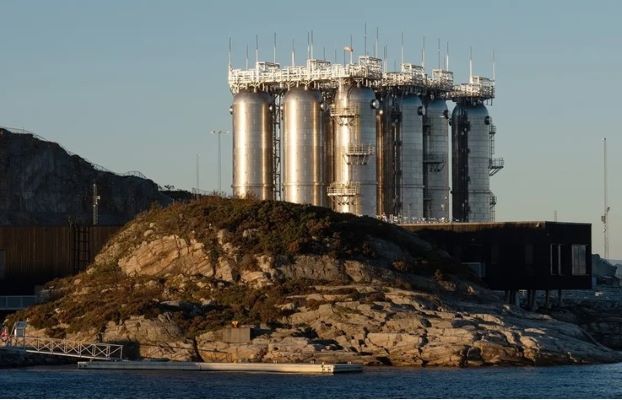The world’s first third party CO2 transport and storage facility is now in operation, contributing to reducing European greenhouse gas emissions

The Northern Lights Carbon Capture and Storage facilities at Øygarden outside of Bergen. Photo: Torstein Lund Eik / Equinor
The first CO₂ volumes have now been injected and successfully stored in the reservoir 2.600 meters under the seabed. The world’s first third party CO2 transport and storage facility is now in operation, contributing to reducing European greenhouse gas emissions.
The CO2 is transported via ships from Heidelberg Materials’ cement factory in Brevik. The CO2 is then offloaded and transported through a 100-kilometer pipeline and injected into the Aurora reservoir under the seabed of the North Sea.
“With CO2 safely stored below the seabed, we mark a major milestone. This demonstrates the viability of carbon capture, transport and storage as a scalable industry. With the support from the Norwegian government and in close collaboration with our partners, we have successfully transformed this project from concept to reality,” says CEO of Equinor, Anders Opedal.
The Northern Lights Joint Venture is equally owned by Equinor, Shell and TotalEnergies. Equinor, as the Technical Service Provider (TSP), has been responsible for the construction of the Øygarden facility and the offshore facilities on behalf of the Northern Lights JV, and will also have operational responsibility of the CO2 plant.
“Lifting new value chains like CO2 capture, transport and storage requires collaboration and effort across the value chain - from governments, industry and customers. With Northern Lights in operation, we have proven that this is possible. Now, we look forward to leading safe and efficient operations on behalf of the Northern Lights partnership and use this as a stepping stone for the further development of CCS in Europe,” says Irene Rummelhoff, Executive Vice President of MMP in Equinor.
The commenced injection of CO2 completes the phase 1 of the development, which has a total capacity of 1.5 million tonnes of CO2 per year (mtpa). The capacity of this phase is fully booked.
In March, the owners of Northern Lights made the final investment decision for the phase 2 of the development, which will increase transport and storage capacity to a minimum of 5 million tonnes of CO2 per year. This decision was made possible after signing of an agreement to transport and store up to 900,000 tonnes CO2 annually from Stockholm Exergi. The expansion is enabled by a grant from the Connecting Europe Facility for Energy (CEF Energy) funding scheme.
The expansion of Northern Lights builds on existing infrastructure and includes additional onshore storage tanks, a new jetty, and additional injection wells. The development of phase 2 with Equinor as TSP is well underway, with the delivery of nine new CO2 storage tanks at the Øygarden site this summer.
Equinor is already one of the largest CCS developers worldwide and has an ambition of having 30-50 million tonnes per annum of CO2 transport and storage capacity by 2035. To achieve this, Equinor is working on several CCS projects in Europe and the US. These projects require a conducive policy framework and collaboration between governments, industry, customers and regulators.
Subscribe to our newsletter & stay updated.